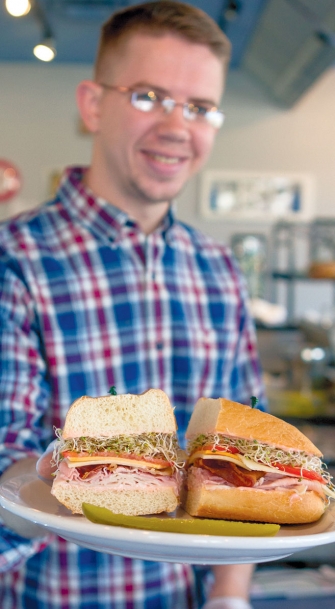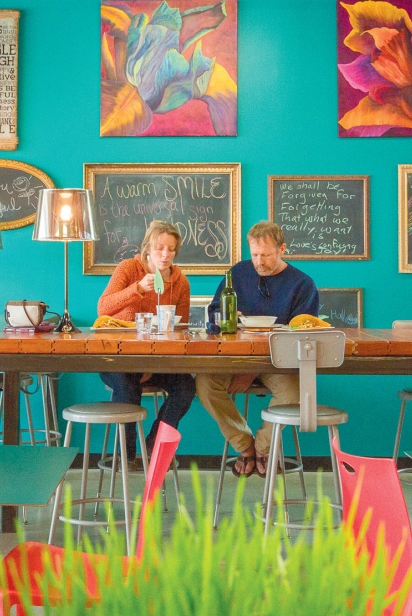Bill of Fair: Boise Eateries Have Mixed Results with the Pay-What-You-Want Model
After a decade of working in what Cameron McCown called the “dog-eat-dog” world of corporate finance and banking, he’d had enough.
“I saw so much inactivity from people who could do something to help others and didn’t, and that makes me mad,” he said, pounding a fist on the table of his small deli in Meridian. “I was in that demographic, too. I became discontent.”
In 2013, he left his job in finance and opened Pot Belly Deli. But after two years, McCown lay awake at night grappling with the feeling that he wasn’t doing enough.
“There was an inconsistency between what I was saying and what I was doing,” he said. “I said I wanted to feed people, to put healthy food in people’s stomachs. But parenthetically I was saying, ‘We want to put quality food in people’s stomachs as long as they have this certain amount of money.’”
On May 5, McCown changed the name of his restaurant at 1535 W. Franklin Rd. to Bread of Life Community Deli and erased all prices off his menu. Now, anyone can walk in and order any soup, salad or sandwich for any amount of money.
McCown joined a growing nationwide trend of restaurants that offer food on a pay-what-you-want scale. The concept was made famous by the popular chain Panera Bread in 2010, but a handful of Treasure Valley restaurants have taken on the challenge as well—with mixed results.
Bread of Life is a simple space, with white walls and blue trim, black tables and chairs. Customers order food, then they either pay nothing, offer cash or swipe their cards on an iPad at the counter. It’s up to the customer to type in the amount, and no one at the restaurant—including McCown—sees what they pay.
And the deli’s sandwiches exceed expectation. Take the Ensenada: juicy chicken layered with melted pepper jack cheese, homemade jalapeño mayo, a sheet of green lettuce, bright red tomato slices and crunchy onions on toasted French bread. And every sandwich comes with a freshly baked cookie—snickerdoodle or chocolate chip.
McCown relies almost entirely on volunteers to run the shop. He has one paid staff member and 15–20 volunteers. McCown takes anyone—from folks who want to earn their meals to people with court-ordered community service hours. He also gives leftovers to a local food bank at the end of the day, which cuts down on food waste.
So far, the pay-what-you-want business model has allowed Mc- Cown to stay in the black.
“On May 5, I feel like I gave up control of my business,” McCown said. “I decided on that day not to white-knuckle it anymore.”
Similar results were not the case for Heather Allen, owner of the Eagle coffee shop Perks of Life at 1540 E. Iron Eagle Dr., who also tried the pay-what-you-want approach last year, but she didn’t rely on volunteers. She ended up having to put prices back on the menu after 13 months.
“I think we’re just not ready for something like this as a society,” Allen said. “Most of us are out to get a good deal, so when you don’t have guidelines, people are, like, ‘Normally I would have to pay $5, but you’re allowing me to pay less, so I’m going to pay $3.’”
She found most of her customers underpaid by 50 cents to $1 for their cups of coffee, pastries and sandwiches—all of which Perks of Life makes in-house. Losing $1 here and 50 cents there added up quickly. She said it was disappointing to go back to a traditional price structure.
“I felt like it was my contribution to the community. We had the guts to do it and we had a good run,” Allen said. “To go back felt like the right choice, even though it hurt.”
Striking a balance between Bread of Life and Perks of Life on the pay-what-you-can spectrum is Kind Cuisine Café, a vegetarian and vegan restaurant nestled in a strip mall at 4628 W. State St. The restaurant boasts colorful artwork on a bright turquoise wall and a long wooden communal table.
For Kind Cuisine’s Plate of Generosity, diners choose a grain, a plant protein, a sauce and a vegetable. On a recent visit, a bed of brown rice ringed with fresh spinach was served on brightly colored Fiestaware. The plate was piled high with cooked carrots, peppers and cabbage along with seared maple tempeh with a nutty, smoky flavor. Kind Cuisine says the idea is to offer a “delicious and nutritious meal” to those unable to pay. And by using prices on the rest of its menu, Kind’s bottom line doesn’t suffer.
McCown said his bottom line hasn’t suffered, either, since he switched to the pay-what-you-want model.
“We don’t want people to overpay. We just let people sit down and enjoy their meal,” McCown said. “When you focus on that, the money tends to be there.”
Jessica Murri loves exploring outside with her dog, Marcy, and spends her time hiking, backpacking, cycling, kayaking, skiing and working as a staff writer for Boise Weekly.





